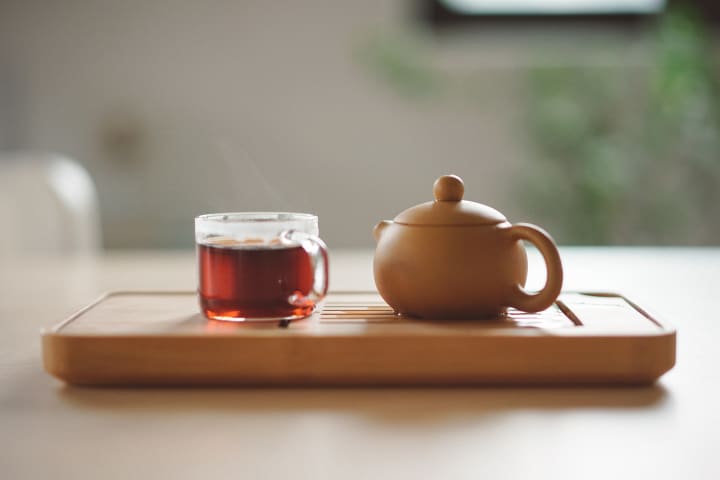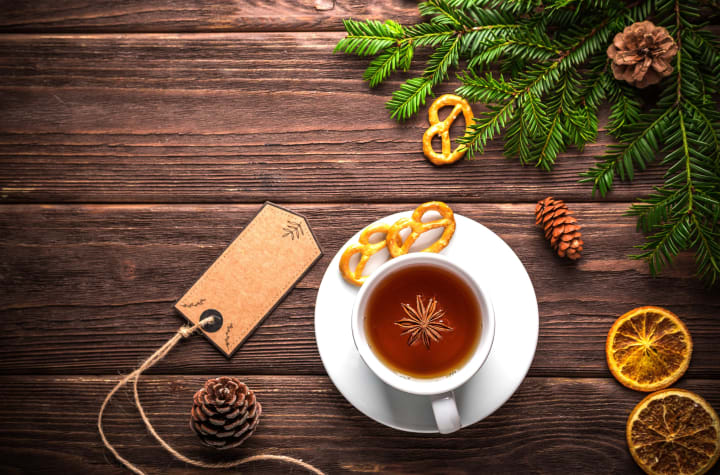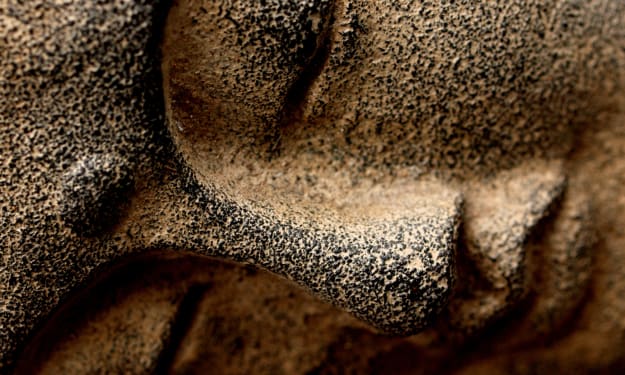The Best Teas To Drink This Winter To Boost Immunity
Put the Liptons in the trash.

"A cup of tea makes everything better," my mother would tell me as she rubbed my back.
Growing up, there were always lots of teas. We all have our quirks, and my moms' was leaving tea cups around the house. No one would dare dump them; she liked it strong. As a kid, I don't recall her ever drinking water-only tea.
As you could imagine, I grew up as a tea connoisseur. In our current home, we boast an entire cabinet devoted to our luxurious collection of teas from around the world in our simple cupboard.
Drinking tea doesn't have to be boring. Ditch the old Liptons that are sitting in your junk drawer and invest in the magic of herbs. We can thank Mother Earth for that. Here are seven teas you should be drinking this winter and how they boost your immunity. Find them in your local grocery store, more conventionally packaged in tea bags instead of loose herbs.
Green Tea & Black Tea (both Camellia sinensis)

Green and black tea contain polyphenols, a type of antioxidant which is vital to good health. Things like flavonoids prevent our body from being infected with free radicals. In turn, the neutralization of free radicals in our body could help prevent diseases severe as cancer.
Researchers claim that people who regularly consume green and black tea have lower rates of cancer. Studies prove that the catechins in green tea are also great for reducing bad breath by killing certain types of bacteria in the mouth. This also reduces the risk of plaque build-up and cavities.
Catechins also serve as a protector for your brain. Studies show this nutrient to lessen the risk of your development of Alzheimer’s and Parkinson’s disease, attributed to less waxy build-ups or plaque in the brain.
It has 30–50mg of caffeine, which is about what you’d find in half a cup of coffee. This will help your brain to stay alert and focused without having to worry about mitigating palpitations while enduring a jittery disposition.
Another nutrient found in green and black tea is called L-Theanine, which works with caffeine to improve brain performance and functioning. This helps your brain to relax, yet stay alert. It could definitely be a tool utilized for entering flow state.
Studies show that green and black tea not only increases your good cholesterol (HDL) but lowers your bad cholesterol (LDL) as well. Thus, it is a good tool to help you manage and reduce your risk of hypertension.
In one randomized study, it was concluded that when black tea is regularly consumed, it contributes to lower levels of cardiovascular risk factors. On a regular basis, this can lead to the reduction of high blood pressure, high cholesterol, and obesity.
Matcha- a derivative of Camellia Sinensis (the same as black, green, and even oolong tea) but prepared differently.

With a high amino acid content, matcha tea has potent health benefits. Matcha is ground down from the entire tea leaf, thus it has a higher ratio of caffeine. This may be linked to higher cognitive performance. Matcha is also rich in catechins, which we know help to stabilize free radicals. This tea may also be able to protect the liver due to its ability to flush out toxins and help absorb nutrients. The L-theanine found in matcha may prevent the caffeine-related crash many people experience after consuming coffee.
While green tea and black tea are highly beneficial, there are some people who have a hard time managing any amount of caffeine in their system. Even though both of those teas have less caffeine than coffee, it can still wreak havoc on those who live a caffeine-free life and/or are sensitive to it.
I personally favor herbal tea because it lacks caffeine. I can consume it at any time of day without having concern for trembling fingers, feeling on edge, or experiencing a rapidly pounding heart.
Herbal Teas
Herbal teas are actually made from dried fruits, flowers, spices, or herbs — not tea leaves. There are SO many herbal teas on the market, and it would be impossible for me to go through everyone. I wanted to include some of my favorites and their health benefits.
Peppermint — Mentha x Piperita

It’s effective at treating fatigue and provides fresh breath, a sense of alertness, and works as a digestive agent post-meal. You can opt for fresh or dried peppermint leaves or store-bought tea bags. Try to opt for organic when possible. Peppermint acts as an antiviral, antibacterial, and anti-tumor healing agent. It also helps to relax the GI tract and may help alleviate IBS symptoms.
Chamomile — Matricaria chamomilla

Known as one of the most calming teas in the world, most people opt for chamomile for its relaxing effects. It’s known to help the brain “go to sleep,” and is especially beneficial for insomniacs. This tea can be consumed daily for maximum benefits which include the reduction of stress and anxiety.
Like green and black tea, chamomile contains antioxidants that help combat free radicals and reduce inflammation in the body. It specifically reduces inflammation in the pancreas, which has been seen to assist in weight loss. With a proper functioning pancreas, chamomile may also benefit those suffering from pre-diabetes or diabetes. Chamomile aids with menstrual cramps by its ability to relieve muscular spasms and cramps.
One randomized study of Taiwanese women looked at the effects of the consumption of chamomile tea in postnatal women who suffered from sleep disturbances. Results of this concluded that the addition of chamomile tea may aid in both depression and sleep issues in postnatal women.
Echinacea

Popular for the belief that this tea may prevent and even shorten the duration of the common cold, this holds to be true at over 60% reduction. With its immune-boosting and anti-inflammatory properties, it’s been linked to relieving upper respiratory symptoms ranging in severity for things like the common cold, asthma, or sinusitis.
Marshmallow Root — Alethea Officinalis

It is a demulcent herb. This means that it soothes the mucous membranes in your body, and it is one that I primarily rely on when I am actively singing for long periods of time. This is a must-know for all vocalists, and certainly for those who suffer from chronic sore throats or strep. It is helpful in bringing moisture to the lungs and serves as a useful alternative to treat canker sores. It is also an effective treatment for those who suffer from yeast infections and is a tactic to treat leaky gut, among other ailments. It’s important to note that marshmallow root may inhibit the absorption of medicine so it’s advised to wait four hours post-med(s) to consume your tea.
In order to get the most nutritional benefits to your tea, avoid adding your tea bag directly to boiling water. This will destroy some important nutrients like catechins. Instead, boil water and add it to a cup mixed with filtered room temperature water. Then add your teabag or fresh tea leaves to steep. The longer you let them steep, the better. Add things like fresh lemon slices because it aids in the absorption of many essential nutrients. You can also add supplements if you desire. For me, I like to add 1ml of concentrated elderberry tincture on occasion.
Tea is good, tea is kind. We should all sit back and drink some more tea.
What's your favorite tea? Let me know.
About the Creator
Susie Pinon
Italian chick with a New Yorker attitude. Free-spirited, eclectic by nature, vegan. I'm fueled by my passion for the art of words. I'm addicted to chocolate + love to heal through the sun's rays. Let's talk words
https://linktr.ee/xosusiep






Comments
There are no comments for this story
Be the first to respond and start the conversation.